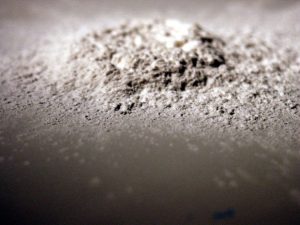A recent study conducted by the American Association for Cancer Research (AACR) reveals that African American women are at greater risk of developing cancer caused by talc exposure than their peers who did not use the genital powder. 
Study authors noted that while regular use of talcum powder was associated with higher rates of ovarian cancer regardless of where it was applied, users who applied the powder to their genitals showed a 40 percent higher risk of cancer, while those who used the powder for non-genital purposes increased the risk by more than 30 percent.
Joellen Schildkraut, an epidemiologist at the University of Virginia and the lead researcher for this study, told Reuters that black women in America were heavily targeted in marketing campaigns for the body powder. Yet it has no real benefit. Still, Schildkraut began her research as a skeptic. She questioned the fiercely debated issue of whether it caused ovarian cancer and other forms of gynecological cancer. She described herself as a cynic. Her latest findings, on top of what has been previously studied by other researchers, have convinced her.
She said that when you look at the proof that has been established in study after study, it becomes clear that this is an “avoidable risk for ovarian cancer,” and she said consumers should steer clear.
Her team interviewed nearly 600 black women with ovarian cancer and another 745 women of color who did not have the disease. The women primarily resided in the eastern, midwestern and southern U.S. Of those interviewed, 63 percent of the women with cancer and 53 percent of the women who did not have cancer were users of the powder. The research, published in the journal Cancer Epidemiology, note black women have historically been grossly underrepresented in epidemiological studies on this issue. Numerous other researchers not involved with the study confirmed to Reuters that the methodology was sound, and the findings affirm what previous studies have established: That use of talc increases consumer risk of developing ovarian cancer. This study revealed even stronger connections between talc use and ovarian cancer than previous research. For example, another study released in December revealed a 33 percent increase in ovarian cancer among women who reported using talc directly on their genitals or on tampons, sanitary napkins or underwear.
As it relates specifically to black women, a case control study conducted last year in California indicated African American females had far higher uses of the powder – 44 percent of black respondents used the product, compared to 30 percent of white female respondents and 29 percent of Hispanic female respondents.
Johnson & Johnson’s marketing strategy in the 1990s specifically targeted minority women, particularly black women. This fact has been revealed in recent product liability litigation which led to multi-million dollar verdicts against the product maker.
Most of the research tackling this issue now is designed to follow participants over time to ascertain whether they are at risk for developing the disease. Although there were two studies that did not find a link, other researchers say those studies were too small to be effective.
Although some scientists have been critical of the latest research and raised the issue of “recall bias” (participants might be more likely to falsely recall they used the powder after hearing about the multi-million dollar verdicts being paid out by Johnson & Johnson), Schildkraut said that was a factor she considered, but said women can be trusted to accurately remember whether they used this product on a regular basis.
The U.S. Centers for Disease Control and Prevention reports some 20,000 American females are diagnosed every year with ovarian cancer. The disease results in 14,500 deaths annually.
If you are the victim of Massachusetts product liability, call Jeffrey Glassman Injury Lawyers for a free and confidential appointment — (617) 777-7777.
Additional Resources:
Talc linked to ovarian cancer risk in African-American women, June 2, 2016, By Ronnie Cohen, Reuters
More Blog Entries:
Hosford v. BRK Brands, Inc.: Products Liability Cases, Sept. 4, 2016, Boston Talc Cancer Attorney blog
 Product Liability Lawyer Blog
Product Liability Lawyer Blog

